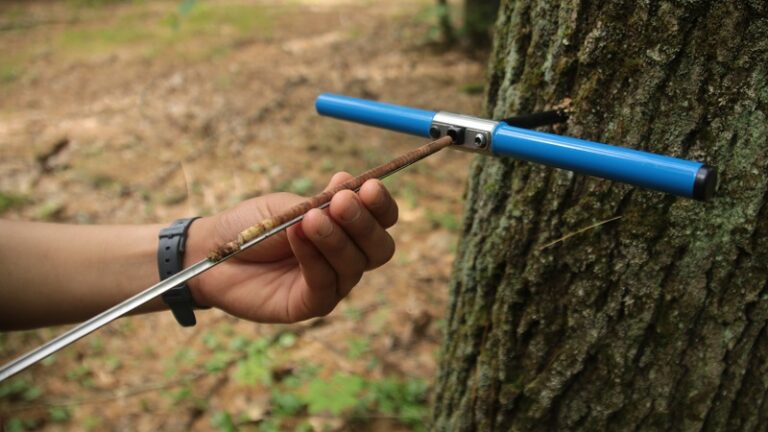Harvard University awards a limited number of Bullard Fellowships annually to individuals representing a variety of disciplines and approaches to the study of forested ecosystems. These full-time residential fellowships allow individuals to foster their scientific and professional growth and to contribute to research on forests at Harvard.
A major goal of the Bullard Fellowship program is to enhance research activities at Harvard Forest and build long-term collaborations that connect Harvard Forest with other parts of the University. Fellows can be based at the Harvard Forest or associated with other departments and centers at Harvard, such as the Department of Organismic and Evolutionary Biology, the Harvard University Center for the Environment, the Salata Institute for Climate and Sustainability, and the Arnold Arboretum. Bullard Fellowships are not intended for post-doctoral fellows; instead, they are targeted at individuals with a record of independent scholarship and professional accomplishment.
Fellowship Scope
Research areas include forest ecology, tree physiology, soil biogeochemistry and microbial ecology, forest resource management, conservation and biodiversity, land use planning, and public policy. Fellowships are occasionally awarded in the arts and environmental humanities. Please note that proposals in the arts and humanities must demonstrate a strong connection to the research at Harvard Forest and will undergo a separate review process led by Harvard University colleagues from the appropriate discipline.
Eligibility
- Bullard Fellowships are generally awarded to individuals who have established themselves in academia, public service, or in the private sector.
- Bullard Fellowships are intended for scholars and practitioners who have demonstrated substantial accomplishment and vision; recent Ph.D. graduates are generally not appropriate.
- For those in academic careers, preference is given to holders of doctoral degrees who received their degrees at least two years prior to applying and have published a monograph or at least two (humanities and social sciences) or five (STEM) articles in refereed journals or edited collections. Applicants from outside academia must demonstrate leadership in their field and propose a project that shows promise of making important contributions to forest studies, broadly defined.
Fellowship
- The Fellowships carry stipends up to $75,000; the amount of each award depends on the duration of the Fellowship. Fellows have the option of having the award paid either to themselves or to the Fellow’s employer.
- In most cases, the stipend will supplement income received for devoting a period to research, e.g., sabbatical leave pay for an individual in academic life, appointments with federal support for training of individuals in federal public service, or educational leave with pay for individuals in the private sector. Fellowships are not intended to provide significant funds for original research.
- Travel Fellowships: All Bullard Fellows will receive a travel fellowship equivalent to the cost of one round trip between their Fellowship site location and their home base. The fellowship will reflect either the actual airfare or mileage (at rate determined by the IRS) between the two, whichever is lower. Bullards are responsible for the travel costs of any people accompanying them.
Application
Fellowships may start at any time after September 1. Fellowships are typically 6 – 12 months in duration.
The application requires:
- A completed web-based application form
- Contact information for 3 references who can give a perspective on the applicant’s proposed program and their personal and professional qualifications for carrying it out. Recommenders should submit their recommendation letters for the 2023-2024 program via the secure online application system by October 15, 2023 (a 2-week grace period post-deadline).
- A statement of research describing the applicant’s professional career to date, proposing a research program at Harvard, and evaluating this program in terms of its potential contribution to the applicant’s future professional career (5 page single spaced maximum is requested).
- CV (no more than 5 pages) including the following:
- Colleges and universities; dates of attendance and degrees received
- Professional positions held since graduating college
- Academic prizes and honors, if any
- Significant books, articles, reports, etc.
- Significant education and outreach activities (NSF calls these “synergistic activities”)
- Artists should provide a link to an online portfolio of their work
Applications must be completed with accompanying documentation by October 1 at 5 pm EST. References are accepted until October 15 Midnight EST. Successful candidates will be notified on or before December 15.
Click HERE To Apply









![Call For Applications: Climate Leadership Fellowship 2023 [Cohort 5]](https://msmeafricaonline.com/wp-content/uploads/2023/08/Climate-Leadership-Fellowship-2023-768x560.jpg)
